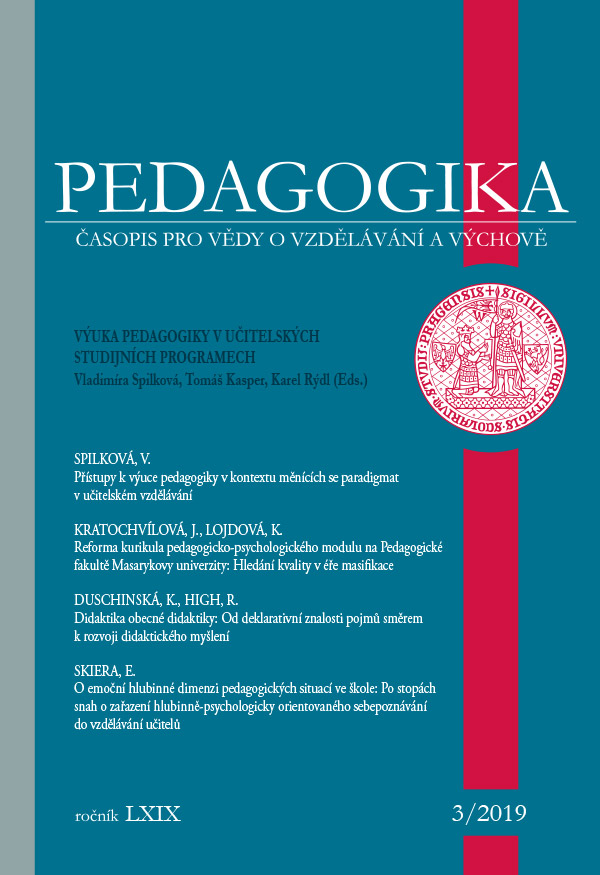On the Emotional Depth Dimension of Pedagogical Situations in Schools: The search for clues on how to integrate depth psychology orientated self-experience in teacher education
DOI:
https://doi.org/10.14712/23362189.2019.1518Keywords:
teacher education, depth psychology, psychoanalysis, analytical psychology, individual psychology, humanistic psychology.Abstract
Although almost every educator knows that the pedagogical space is filled with profound emotions that shape the interactions, it has so far hardly been possible to give the associated questions an appropriate place in teacher education. Nevertheless, there are approaches that attempt to integrate depth psychological aspects into the “normal” teacher education for pre-school, primary and secondary education. Of decisive importance here are those concepts that go beyond theory-based information or teaching and the study of relevant texts in lectures and seminars, and integrate elements of self-reflection and “reflexive self-awareness” curricularly and institutionally. Only by a lively connection of personal experience and reflection can deep psychological knowledge be acquired critically and constructively as well as become practically effective. With regard to the development of concepts for the teaching profession, it would be extremely helpful if the well-known “quarrel of the schools” could be transformed into a creative dialogue, including not only the different psychoanalytical perspectives but also the different approaches within the field of humanistic psychology.
Keywords: teacher education, depth psychology, psychoanalysis, analytical psychology, individual psychology, humanistic psychology.
References
Adorno, T. W. (1965). Tabus über dem Lehrerberuf [Tabu učitelského povolání]. (Online). Dostupné z www2.ibw.uni-heidelberg.de/~gerstner/TabusText.pdf
Ballauff, T. (1969). Pädagogik: Eine Geschichte der Bildung und Erziehung [Pedagogika: Dějiny vzdělávání]. Sv. 1. Freiburg: Karl Alber.
Brück, H. (1978). Die Angst des Lehrers vor seinem Schüler. Zur Problematik verbliebener Kindlichkeit in der Unterrichtsarbeit des Lehrers - ein Modell [Strach učitele ze svého žáka. K problematice zbývající dětskosti ve výukové práci učitele - model]. Reinbek bei
Hamburg: Rowohlt.
Datler, M. (2012). Die Macht der Emotion im Unterricht. Eine psychoanalytisch-pädagogische Studie [Síla emocí ve výuce. Psychoanalyticko-pedagogická studie]. Gießen: Psychosozial Verlag.
Dauber, H., & Zwiebel, R. (2006). Professionelle Selbstreflexion aus pädagogischer und psychoanalytischer Sicht [Profesionální sebereflexe z pedagogického a psychoanalytického hlediska]. Bad Heilbrunn: Klinkhardt.
Erasmus Rotterdamský (1960). Das Lob der Torheit [Chvála bláznivosti]. Basel und Stuttgart: Birkhäuser. (1. vyd. 1511).
Gitz-Johansen, T. (2016). Jung in education [Jung ve vzdělávání]. Journal of Analytical Psychology, 61(3), 365-384.
https://doi.org/10.1111/1468-5922.12234
PMid:27192370
Herrmann, U. (Ed.). (2012). Reformpädagogik: Eine kritisch-konstruktive Vergegenwärtigung [Reformní vzdělávání: Kriticky konstruktivní vizualizace]. Bad Heilbrunn: Klinkhardt.
Huber, M. et al. (Ed.). (2018). Bildung und Emotion [Vzdělání a emoce]. Wiesbaden: Springer.
https://doi.org/10.1007/978-3-658-18589-3
Jung, C. G. (1926). Analytische Psychologie und Erziehung [Analytická psychologie a vzdělávání]. Heidelberg: Kampmann.
Mayes, C. (2017). Teaching and learning for wholenesss [Výuka a učení pro celistvost]. Lanham: Rowman.
Reimer, G (2006). Unbewusste Beziehungsformen zwischen Lehrern und Schülern [Nevědomé vztahové formy mezi učiteli a žáky]. Dizertační práce. Univerzita Duisburg-Essen. (Online).
Rüedi, J. (1995). Individualpsychologische Lehrerinnen- und Lehrerbildung - ein Erfahrungsbericht [Individuálně psychologická příprava učitelek a učitelů - zpráva z terénu]. Zeitschrift für Individualpsychologie, 20, 23-31.
Semetsky, I. (Ed.). (2013). Jung and educational theory [Jung a vzdělávací teorie]. Chichester, UK: Wiley.
https://doi.org/10.1002/9781118297308
Skiera, E. (2010). Reformpädagogik in Geschichte und Gegenwart. Eine kritische Einführung [Reformní vzdělávání v historii a současnosti. Kritický úvod]. München: Oldenbourg.
https://doi.org/10.1524/9783486851328
Skiera, E. (2011). Reflexive Selbsterfahrung als Weg zur Seele. Übungen zur Vertiefung der Beziehung zu sich selbst, zum Anderen und zur Natur [Reflexní sebevědomí jako cesta k duši. Cvičení k prohloubení vztahu se sebou samým, ostatními a přírodou]. Bad Heilbrunn: Klinkhardt.
Spiel, O. (1947/1979). Am Schaltbrett der Erziehung [Na desce vzdělání]. Bern u.a.O.: Hans Huber.
Univerzita v Kasselu (2016). Kurzfassung Projekt BASIS "Personale Basiskompetenzen für den Lehrerberuf" [Krátká verze projektu "Osobní základní dovednosti pro učitelskou profesi"]. (Poskytl spoluautor H. Dauber).
Univerzita v Kasselu (2018). Flyer "Konfliktberatung für Pädagoginnen" ["Konfliktní konzultace pro pedagogy"]. Dostupné z www.uni-kassel.de
Wisniewski, B. (2016). Psychologie für die Lehrerbildung [Psychologie pro vzdělávání učitelů]. Bad Heilbrunn: Klinkhardt.
Würker, A. (2007). Lehrerbildung als Szenisches Verstehen. Professionalisierung durch psychoanalytisch orientierte Selbstreflexion [Vzdělávání učitelů jako scénické chápání. Profesionalizace pomocí psychoanalyticky orientované sebereflexe]. Hohengehren: Schneider.



